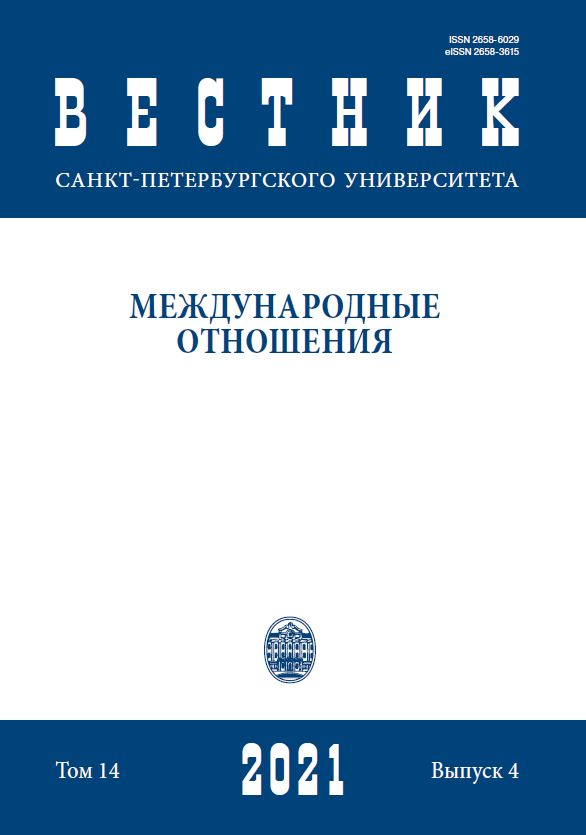The aging leader: Approaching age as a factor in international relations
DOI:
https://doi.org/10.21638/spbu06.2021.405Аннотация
This article goes against the grain of traditional approaches in international relations by claiming that a leader’s biological age is a factor in this individual’s execution of foreign policy. The traditional logic of political science that has generally been diminishing the impact of a leader’s individual features on policy for the sake of institutional procedures needs to be reassessed. A common assumption is that an aging king or president, especially those entering the eighth or ninth decade of their lives, are likely to make prudent, balanced, and wise political decisions due to their rich experience. However, this notion lacks sufficient empirical support from history. The physical “wear and tear” of the aging leader, along with their declining psychological functions, are likely to negatively impact their foreign-policy decisions that may fall under the influence of the leader’s information overload, cognitive narcissism, profound stubbornness, as well as their irrational sense of urgency, and their tendency to overcompensate. In democracies, the political tenure of top politicians is limited by constitutional terms or scheduled elections. In authoritarian systems, only the top figure’s death or incapacitation become actual “schedulers” of their political tenure. Although a person’s advanced age should not disqualify him or her from public office, without institutional checks on the leader’s judgements and behavior as well as the critical power of public opinion and the press, the aging authoritarian leader can become unpredictably risky.
Ключевые слова:
aging leader, authoritarian leader, information overload, political hoarding, cognitive narcissism
Скачивания
Библиографические ссылки
References
Reagan ‘jokes’ about bombing Soviet Union, Politico Aug. 11, 1984. November 8, 2017. Available at: https://www.politico.com/story/2017/08/11/this-day-in-politics-aug-11-1984-241413 (accessed: 02.09.2021).
Kuklinski, J. (ed.) (2001), Citizens and Politics: Perspectives from Political Psychology, New York: Cambridge University Press.
Janis, I. L. (1982), Groupthink: psychological studies of policy decisions and fiascoes, Boston: Houghton Mifflin.
Schaie, K. W. and Willlis, S. (2015), Handbook of the Psychology of Aging (Handbooks of Aging), 8th ed., New York: Academic Press.
Robins, R., and Post, J. (1995), When Illness Strikes the Leader: The Dilemma of the Captive King, New York: Yale University Press.
Knaus, W. (1982), When Will Brezhnev Meet His Maker? Washington Post, April 11. Available at: https://www.washingtonpost.com/archive/opinions/1982/04/11/when-will-brezhnev-meet-his-maker/0100879cd4bc-4f70-8e73-0304bb43088a/(accessed: 02.09.2021).
Dahir, A. A. (2017), Robert Mugabe isn’t sleeping through meetings — he’s protecting his eyes from “bright lights”, Quartz Africa, May 11. Available at: https://qz.com/africa/981636/photos-all-the-times-zimbabwes-president-robert-mugabe-was-caught-on-camera-sleeping-in-conferences/(accessed: 02.09.2021).
Noelle-Neumann, E. (1974), The spiral of silence: a theory of public opinion, Journal of Communication, vol. 24, is.2, pp. 43–51, doi: 10.1111/j.1460-2466.1974.tb00367.x, S2CID 59515037.
Myers, B. R. (2011), The Cleanest Race. How North Koreans See Themselves and Why I Matters. New York: Melville House.
Icks, M. and Shiraev, E. (2014). Character Assassination Throughout History, New York: Macmillan.
Volkan, V. D. and Itzkowitz, N. (1984), The Immortal Atatürk: A Psychobiography, Chicago: University of Chicago Press.
Zhi-Sui Li (1996), The Private Life of Chairman Mao, New York: Random House.
Zubok, V. (2007), A Failed Empire. The Soviet Union in the Cold War from Stalin to Gorbachev, Chapel Hill: University of North Carolina Press.
Lau, R. and Redlawsk, D. (2008), Older but Wiser? Effects of Age on Political Cognition, The Journal of Politics, vol. 70, iss. 1, pp. 168–185.
McIntyre, A. (ed.) (1988), Aging and Political Leadership, New York: SUNY Press
Little, G. (1988), Ronald Reagan’s Dorian Gray Complex, Aging and Political Leadership, in McIntyre, A. (ed.), New York: SUNY Press, pp. 260–282.
Twenge, J. and Campbell, K. (2009), The Narcissism Epidemic: Living in the Age of Entitlement, New York: Atria Books.
Mankiw, G. (2018), Principles of Economics, 8th ed., Boston, MA: Cengage Learning.
Kelly, M. (1992), The 1992 Campaign, The New York Times, October 31. Available at: https://www. nytimes.com/1992/10/31/us/1992-campaign-democrats-clinton-bush-compete-be-champion-changedemocrat-fights.html (accessed: 02.09.2021).
Berton, R. and Panel, S. (2020), Gerontocracy in a comparative perspective: Explaining why political leaders are (almost always) older than their constituents, Sociology Compass. Available at: https://onlinelibrary. wiley.com/doi/epdf/10.1111/soc4.12841 (accessed: 02.09.2021).
Загрузки
Опубликован
Как цитировать
Выпуск
Раздел
Лицензия
Статьи журнала «Вестник Санкт-Петербургского университета. Международные отношения» находятся в открытом доступе и распространяются в соответствии с условиями Лицензионного Договора с Санкт-Петербургским государственным университетом, который бесплатно предоставляет авторам неограниченное распространение и самостоятельное архивирование.




